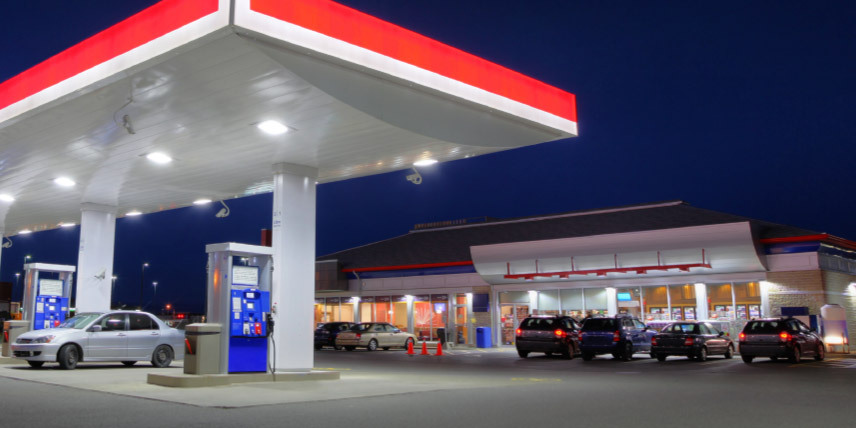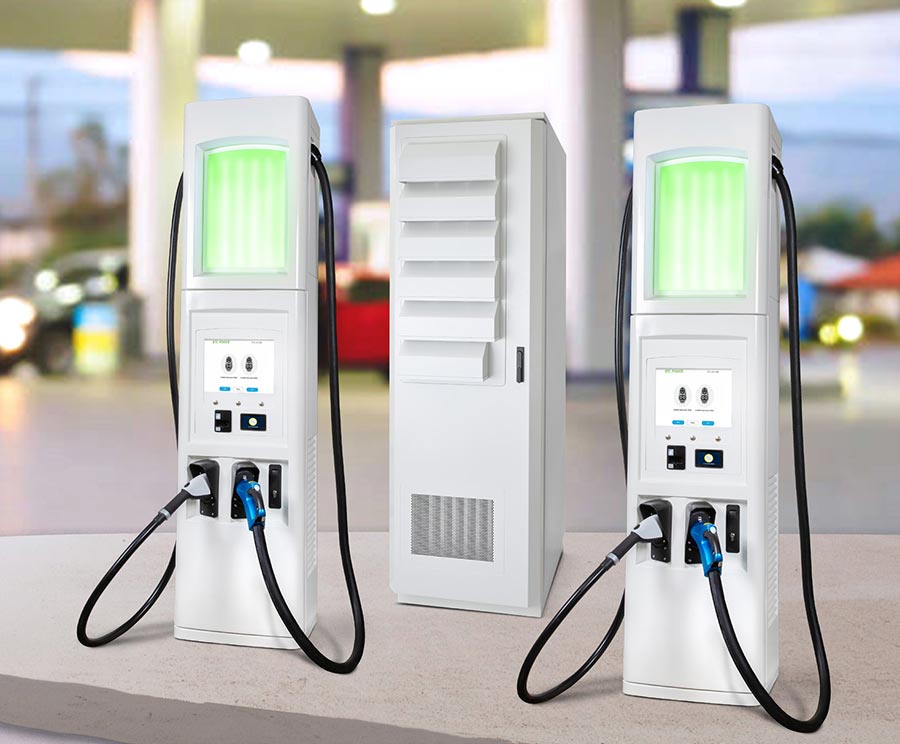
In recent years, the electric vehicle (EV) industry has grown at a remarkable pace and is projected to continue this upward trend. Bloomberg analysts predict that more than half of all passenger cars sold in the U.S. will be electric by 2030. As more people turn to EVs as their preferred mode of transportation, convenience stores are in the perfect position to capitalize on this trend by installing EV charging stations.
So, what’s in it for C-store owners? More foot traffic, increased “shopping time,” an early jump on coming regulations and available funding.
This blog touches on some of key factors further explained in our white paper, Finding the Right EV Chargers for Your Convenience Store, on this topic – why convenience stores should invest in commercial EV charging stations now and how to take advantage of available federal funds. We’ll also discuss the differences between the types of commercial EV charging stations currently available and why BTC POWER’s 180kW All-in-One DC Fast Charger is a dependable choice for convenience store locations.
Convenience stores in prime position to leverage EV charging stations
Convenience stores have long acted as dependable stopping points for impromptu fuel needs and other necessities. As it stands now, 80% of convenience stores sell gas, accounting for 80% of fuel pumped in the U.S. every year. And an average 70% of fuel purchasers enter the convenience store while pumping gas for other purposes. As EVs grow in popularity, convenience stores can leverage their reputations as car fueling oases for fossil fuel vehicles into a similar, yet “supercharged” version of the same for EV drivers.
Let’s discuss how the EV buyer experience can become “super-charged” for convenient store owners. While DC fast chargers offer the quickest options for charging an EV, it does take slightly longer than pumping gasoline. This difference gives drivers more time to browse and shop inside the convenience store during their “fuel” breaks, enabling convenience store owners to upsell from the traditional quick snack or beverage. So it not only represents a potential increase in foot traffic, it’s also an increase in shopping time.
The location of convenience stores are another prime “position.” Convenience stores with fueling stations often are located along major highways, often within a mile, which opens up the possibility of federal funding available through the NEVI Infrastructure Bill. The NEVI funding program allows C-store owners to tap into accessible federal funds, allocated to each of the fifty states, to ease the cost of installing an EV charging station. So just like trying to grab motorists passing through with a conveniently located gas station, you’ll be able to do the same with EV drivers with the added bonus of 80% funding.
In addition, providing EV charging brings in a new set of customers who currently don’t have a need for gas stations or traditional gas station commodities. Ultimately, convenience stores are well situated to capitalize on the growth of EVs by offering fast and convenient charging points through DC faster chargers, while maximizing customer satisfaction as well as potential profits.

EVs align with state and federal goals to combat climate change. Jump in now!
With the increasing urgency to combat climate change, state regulations, such as those in California, are mandating electric vehicles, resulting in a booming market. Add to this the NEVI program funding that will allocate $5.4 billion during the next five years among all 50 states to install EV charging stations along major highways and thoroughfares.
This initiative provides EV drivers with confidence and convenience when taking longer trips, the ones fueled by road trip food bought along the way. More EV charging stations allow drivers to drive further than before, opening previously skipped areas to tourism and increased traffic. This federally funded program presents convenience store owners with an exciting opportunity to invest, with 80% of the costs covered, in green infrastructure and help foster more sustainable communities, to improve brand image and attract more customers.

Which type of EV charger should a convenience store choose?
In short, a DC fast charger is the best option for C-stores. A DCFC (Direct Current Fast Charger) converts AC power to DC, with the charger sending power directly to the EV battery for charging. This allows for higher charging rates when compared to delivering standard AC energy that has to be converted to DC within the vehicle before delivery to the battery, and inherently has slower charging time. Currently, industry standards limit AC charging power to 19.2kW.
The EV acceptance rate differs from one vehicle to another, determining how much charge it can accept. Newer EVs can charge at higher rates of 120-180kW and even 270-plus kW. However, as EVs evolve, the charging capability of the EV battery will too. This is why C-store owners should work with an EV charger manufacturer who can walk them through the different options that could be “future proof.”
Also, an EV charger manufacturer can help navigate the two EV charger types are commercially available: those with integrated battery packs that require less input power but have higher initial costs, and non-battery chargers which operate on direct utility power.
Static battery-powered charging stations, those with the integrated battery packs, can frustrate customers that will spend an extended time charging their vehicles. It can also spark bad customer reviews, a damaged business reputation and ruin flip time by strictly limiting the total number of customers able to use the station.
A standard (non-battery) charger, such as BTC Power’s 180kW All-in-One DC fast charger, can charge electric vehicles in as little as 10 to 15 minutes consistently, leading to faster turnover and happy customers that come back time and time again.
Key features of this charger include Buy America compliance for NEVI funding and CCS1/CHAdeMO connector options allow for a broad range of EVs to obtain a charge. It also offers a unique simultaneous charging option, an added level of efficiency that allows more than one user to charge at the same time. It also features touchscreen options for credit card or RFID payments.
The 180kW All-in-One’s compact design occupies the same or similar space of a standard gas pump. The integrated retractable cables help minimize cable wear, adding to improved customer experience, at a lower cost of ownership overall, than other chargers available on the market today.
Looking for more information about EV chargers for convenience stores? Check out the white paper, Finding the Right EV Chargers for Your Convenience Store, or contact us to get started today.

